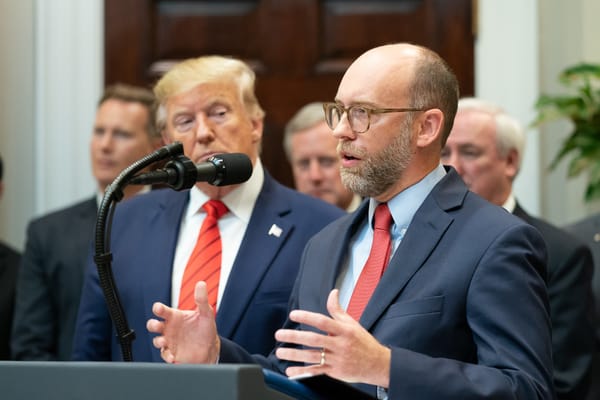State policy roundup: Clean energy updates in Pennsylvania, New Jersey, Illinois, and more
Quitting Carbon checks in on policy developments you might have missed with a roundup of state-level climate action.

Quitting Carbon is a 100% subscriber-funded publication. To support my work, please consider becoming a paid subscriber or making a one-time donation.
I have several stories in the works, with none of them ready to publish this week. So, here instead is a roundup of notable state-level clean energy developments I’ve tracked in recent weeks.
Expect to hear from me again at mid-week next week, when I’ll be marking a big milestone for Quitting Carbon.
And for any of my San Francisco Bay Area readers who are attending Canary Media’s live event in downtown Berkeley tonight, I’ll be there as well. Find me and say hello!
Plug-in solar could be coming to Pennsylvania
I was early to report on the nascent plug-in solar industry here in the U.S. In case you missed it, do read my interview with Meghan Wood, co-founder of startup Raya Power.
Following the lead of first-movers like Utah, New Hampshire, and Vermont, other states have been busy passing or taking up legislation to enable the installation of so-called “balcony” or “plug-in” solar systems. Another state just joined the list.
Last week, Pennsylvania State Rep. Chris Pielli (D), along with co-sponsors state Reps. Elizabeth Fiedler (D) and Mark Gillen (R), introduced legislation (HB 1971) that would “eliminate barriers that Pennsylvanians face when it comes to accessing plug-in solar energy.”
According to Rep. Pielli’s office, “the bill eliminates the requirement to obtain an interconnection agreement and prohibits electric distribution companies from imposing fees on systems that have obtained national safety certifications.”
Plug-in solar systems would not be eligible to participate in Pennsylvania’s net-metering program.
“Plug-in solar will give renters, apartment dwellers and homeowners a way to generate some of their own power and cut monthly costs. This isn’t about politics; it’s about putting money back in family budgets and giving people control over their energy in whatever space they have,” said Pielli in a statement.
New grant funding for clean energy building retrofits in New Jersey
In New Jersey, state officials recently approved a $75 million pilot retrofit program for large commercial, industrial, and institutional buildings.
The RETROFIT NJ (Reducing Emissions through Retrofits, Optimization, Fuel-switching, and Innovative Technologies) grant program expands upon the existing NJ Cool program to “support multi-pronged, large-scale retrofit projects that enable holistic energy improvements, including solar + storage, for buildings, campuses and multi-building facilities,” reported Solar Power World’s Kelsey Misbrener last week.
The program “will offer grant awards between $2.5 million and $12.5 million to commercial, industrial and institutional building owners undertaking retrofit projects with a minimum total project cost of $5 million,” she wrote.
“Eligible projects must include at least three clean energy or electrification components, such as solar, energy storage, electrification of heating, refrigerant replacement and energy efficiency upgrades.”
The pilot is funded by Regional Greenhouse Gas Initiative auction revenue allocated to the New Jersey Economic Development Authority. RETROFIT NJ applications are expected to open in the first quarter of 2026.
A sweeping clean energy bill, and a transit lifeline, advance in Illinois
Last week, lawmakers passed legislation (SB 25) Capitol News Illinois’ Andrew Adams described as “the largest change to Illinois’ energy policy in at least four years.”
“An energy policy package incentivizing battery storage passed the General Assembly with only Democratic support and will likely become law, as Gov. JB Pritzker pledged to sign it,” reported Adams.
“The bill creates a new funding mechanism for energy storage projects, lifts the state’s ban on new large-scale nuclear power, creates requirements for utilities to implement energy efficiency programs and more.”
Among the Clean and Reliable Grid Affordability Act’s other provisions are policies to support the rollout of geothermal heating and thermal energy networks (TENs).
“A TENs pilot program, administered by the Illinois Commerce Commission and Illinois Finance Authority, will provide up to $20 million to advance neighborhood-scale TENs while ensuring strong labor standards and customer protections,” according to a Building Decarbonization Coalition press release.
Illinois lawmakers also passed legislation last week that provides a lifeline for Chicago’s cash-strapped transit system. The Chicago Transit Authority had been among the transit systems in large U.S. metro areas, including SEPTA in Philadelphia, TriMet in Portland, Oregon, and BART in the San Francisco Bay Area, facing a fiscal cliff as ridership continues to lag pre-COVID levels and fare revenue hasn’t kept pace with rising system costs.
“The Illinois state legislature passed a bill Friday to restructure the Chicago region’s transportation authority, provide $1.5 billion in funding for public transportation agencies and support transit-oriented development,” reported Smart Cities Dive’s Dan Zukowski.
“The legislation addresses potential service cuts and fare hikes that were to go into effect in 2026, though details remain to be ironed out.”
Model climate laws clearinghouse intends to boost state-level climate action
As long as Donald Trump sits in the White House and Republicans control Congress, U.S. climate action will be the province of the states. And in states where Democrats hold the governorship and control the legislature – a list that now includes Virginia, where the Democratic Party won a governing trifecta in Tuesday’s election – support for the climate fight can flourish.
Lawmakers in these states now even have a repository of model climate laws waiting to be cribbed from and then introduced in their legislative chambers: the Model Climate Laws Initiative.
“Legal experts at Columbia University and New York activists have teamed up to launch a factory to churn out draft laws for state legislatures to tackle climate change, pulling from conservatives’ playbook,” the Washington Post’s Jake Spring reported in early July when Columbia Law School’s Sabin Center for Climate Change Law and the non-profit Environmental Advocates NY launched the initiative.
“Many state legislators and agencies have excellent ideas for new climate policies but they lack the legal assistance necessary to turn them into laws. This Initiative will help provide that assistance and drafting expertise,” said Michael Gerrard, founder and faculty director of the Sabin Center, in a press release.
According to the initiative, its team “has authored over 80 model laws that are a starting place for discussion and collaboration among elected officials, non-profit groups and the private sector.”
It has also compiled Top 10 lists for sectors such as commercial and residential buildings, transportation, and electricity “highlighting some of the most interesting model laws or other resources that state or local governments can utilize.”
EU looks to partner with states on climate action
U.S. states committed to climate action could soon have a willing foreign partner: the European Union.
The Financial Times reported last month that the EU planned to bypass Washington and the Trump administration and would instead work with state and local governments and businesses in the U.S. to advance its green agenda.
“The United States is today a major EU energy trading partner and a key ally in accelerating the EU phase-out of Russian fossil fuels. However, it is also the second largest global greenhouse gas emitter and recently left the Paris Agreement,” wrote the authors of a policy paper published by the European Commission on October 16.
“The EU will continue to cooperate with the US in the clean energy transition and on clean technologies, including with subnational entities, business and think tanks.”




